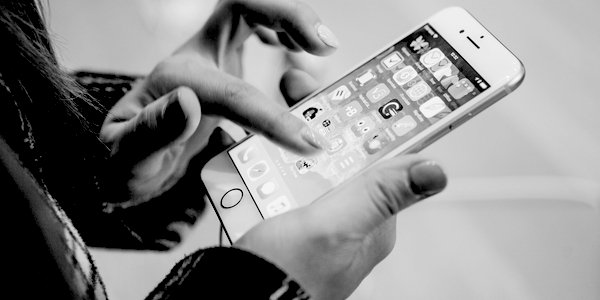THE Great Reset, ludicrously described on Wikipedia as a ‘far-right conspiracy theory’, is a carefully designed plan, enacted by the World Economic Forum, to create a global technocracy. Collectively, we are doing much of the work for our masters. We are being herded, numbered and controlled, and we are voluntarily using the tool for our enslavement: the smartphone.
‘Why you should destroy your smartphone now’ is the concluding chapter of Simon Elmer’s latest book The Great Reset: Biopolitics for Stakeholder Capitalism. Elmer uses an old Nokia phone. How does he cope, friends ask him. He replies that he has a phone for emergencies, and doesn’t feel the need for constant internet connection. I can beat him – I have no mobile phone at all. But such opting out is extremely rare: a few lingering elderly who have no desire to go digital, and a minority of younger outcasts.
Elmer explains how your mobile phone is a totalitarian’s dream come true: ‘Smartphones, during the two years of lockdown, were the instrument on to which the Covid-faithful downloaded the app that connected them to the Test and Trace tracking programme that identified and recorded their location, movements, associations and personal contacts. And in the imminent future, smartphones will be the instrument on to which, in the guise of the digital verification of our identity, the compliant will upload their biometric (fingerprints, photograph and DNA swab) to a centralised database to which the 32 public authorities presiding over the UK biosecurity state will have access.’
It doesn’t stop with surveillance in the guise of health. Justified by the contrived climate crisis, smartphones will be deployed in 15-minute cities to restrict movement, carbon footprint will be measured to limit access to products and services, and money will be in the form of a digital wallet accessible only by smartphone and under central bank control. The smartphone is vital to the Fourth Industrial Revolution mission to fuse bodies with the digital matrix (in the near future) through implanted microchips rather than a handheld device.
‘Smartphones, therefore, are the technology of our enslavement,’ Elmer warns. Lured by convenience and the dopamine hits of social media compulsion, people are building their own prison. Elmer suggests that ‘our addiction to smartphones is changing not only our relationship to the world and how we live with each other but also, and primarily, human consciousness itself.’
This was the theme of neuroscientist Susan Greenfield’s book Mind Change: How Digital Technologies are Leaving their Mark on our Brains (2014). Reviewing reams of scientific reports, Greenfield claimed that digital technology has adverse impact on child development, rewiring brains and adversely affecting personality, identity and relationships.
The Covid-19 regime showed Elmer that ‘a distracted population is more subject to manipulation’. Government behavioural psychology exponents have a ready feedback loop in social media activity. Introduce a radical idea into the online talking shop and study the response. Indeed, as Elmer states, ‘the knee-jerk reaction of the social media addict has become the norm for political debate.’
Many users have relinquished their critical faculties and morality to ‘easily triggered expressions’ of fear, anger, guilt and revulsion. The ‘two-minute hate’ induced by telescreen propaganda in Orwell’s Nineteen Eight-Four was remarkably prescient.
Smartphones are not yet compulsory, but are effectively becoming so. The networks for the second and third generation mobiles (including Elmer’s Nokia) will be withdrawn soon, as will be landlines (my only telephonic access). This year the government sounded an emergency alert to all mobile phones (except where the user disabled the function). ‘When you get an alert stop what you’re doing and follow the instructions’ was the message to the alerted. Next time, the wolf will have more bite: smartphones will be made inoperable until the user does whatever is required, and potentially the sanctions for those failing to comply promptly will include remote cutting of electrical supply to their homes. As Elmer remarks, ‘slavery is the common good’.
But he thinks there is hope: ‘We are not as stupid and compliant as we were in March 2020.’ People have woken to realise that ‘our governments are not there to represent us, do not have our best interests or those of our nation at heart, and are, to the contrary, intent on impoverishing, disenfranchising and enslaving us’.
We must remove the invisible but overpowering ball and chain. Few people will abandon their smartphone, as life would be difficult without it, but everyone can do their bit to stay free. Don’t use a smartphone when you can use cash. Leave the phone at home when you go out with friends: it may be strange and anxiety-provoking initially, but soon you will find it intensely liberating. To drop the pilot is a revolutionary act.
Simon Elmer’s new book, The Great Reset: Biopolitics for Stakeholder Capitalism, is available as a hardback, paperback and ebook.

